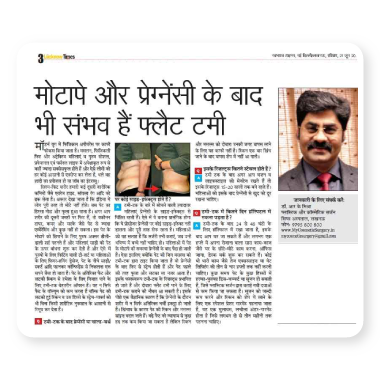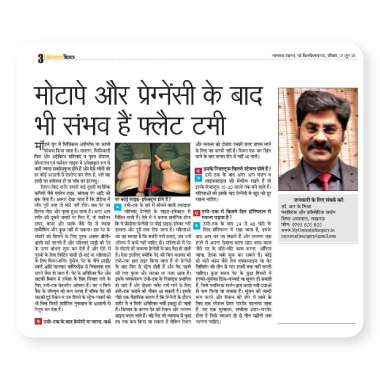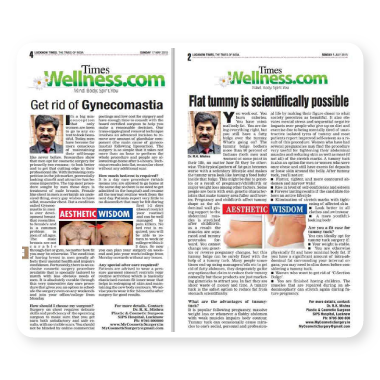Copyrights © 2022. All Right reserved by MyCosmeticSurgery
Overweight & Obesity are accumulation of excessive fat due to an imbalance between energy intake (food) and expenditure (activity).
Obesity is one of the most deadly & slow killer and involves almost all parts & system of body. Every disease becomes more severe in presence of obesity.
Common complications or diseases due to obesity are:

BMI is a tool calculated from persons height and weight , and use to analyze and determine whether he/she is overweight , underweight or is healthy. Body Mass Index is calculated by dividing the weight (in kilograms) of a person by his height in meters squared.
BMI = Weight [kg] / Height [m^2]


There are several methods available to address morbid obesity :
A. Behaviour or Lifestyle Modification (healthy dieting & exercise)


A few suggested behaviour modifications includes changing eating habits, increasing physical activity, engaging in a outdoor sports and extracurricular activity & setting realistic weight management goals. A moderate exercise for 30-60 min per day is recommended for weight reduction. A nutritionally balanced, low calorie, low fat diet is recommended for weight loss. It should also be high in fiber along with adequate amount of proteins, vitamins and minerals.
Tips for healthy dieting are :
A consistent exercise or activity plan aids in reaching and maintaining an optimal weight loss, as well as helping to:
B. Drug Treatment
A significant amount of Weight loss can be achieved with the help of certain drugs to be taken under supervision of Physician. As with all drugs there are side effects rendering them unsuitable for some patients. However if a patient is able to tolerate the drugs it may be a useful approach when patient does not want to undergo a surgical procedure or is unfit for surgery.
C. Surgical Option
Surgical Options for the management of Obesity are –


Liposuction is the removal of excess fat deposit from the body through very tiny holes. It is frequently performed to reduce fat in the hips, thighs, abdomen, upper arms and other areas of fat deposits below the skin. The limitation of liposuction is that it can not remove fat deposits in side of your abdominal cavity (Omental, Mesenteric & intestinal fats). So liposuction is beneficial as a weight reduction tool only in those persons where most of the fat is deposited under the skin & subcutaneous tissue. The immediate benefits of liposuction can be both physical and mental. The greatest mental benefit is that the patient gains an incredible boost of self esteem due to greatly improved body image. Liposuction is suitable for moderate obesity (BMI < 35 and preferably without any co-morbidities).


Body contouring (combination of liposuction, abdominoplasty & sometime belt lipectomy) are very useful procedures in hanging type of obesity or hanging abdominal pouches, as seen in most of the obese middle aged Indian women, especially after multiple childbirths. Body contouring is also required after major weight loss and is almost like having your clothing (your skin) tailored and resized to fit your new body. Body Contouring Options After extreme Weight Loss.
Bariatric Surgery either limit the amount of food a patient can take (Restrictive) or reduce the ability of the patient to digest and absorb food (mal-absorptive). A third approach may be the combination of both.


A. Adjustable Gastric Banding (also known as the LAP – BAND )
In this procedure, a hollow band made of silicone rubber is placed around the stomach near its upper end, creating a small pouch and a narrow passage into the rest of the stomach. Though its a simple procedure but long term side effects like chances of erosion of band into the stomach makes this procedure almost obsolete these days.
B. Vertical Sleeve Gastrectomy
Vertical sleeve gastrectomy is the simple, highly effective & most commonly performed bariatric surgery procedure. Capacity of stomach is restricted by converting the stomach into a narrow tubular structure. It generates rapid weight loss by restricting the amount of food that can be eaten without any bypass of the intestines or malabsorption.




C. Duodenal Switch / Biliopancreatic Diversion (BPD)
It generates weight loss by restricting the amount of food that can be eaten (partial gastrectomy).
D. Roux-en-Y Gastric Bypass (RGB)
This operation is a combination of restrictive and malabsorptive procedure. This procedure is performed is very morbidly obese patients (BMI > 55 or 60).


Post Operative diet is divided in to the following phases:
After 3-months, one can progress to eating regular foods & proteins become a major part of the diet after surgery. Taking three small meals and three healthy snacks a day. Meals will focus on lean sources of protein, fruits, vegetables and whole grains, along with vitamin and mineral supplements for life, to compensate for the nutrients that are no longer able to absorb through the bypassed parts of the stomach and intestine.
You are advised to visit your doctor on your scheduled follow up or at least every 6-months for the rest of your life after undergoing bariatric surgery.










What Our Patients Say
Sliding genioplasty by doctor R.K Mishra. I had a receding chin and was insecure about it my whole life. I researched about my issue over the internet and found that it could be fixed so I started consulting with several plastic surgeons online. I came across the website of Dr. R. K. Mishra and was impressed with the detailed information. I contacted him thorugh emaila and his reponses were always very quick, I really appreciate that I booked a date....
It was an adventure to me & hence, I want to share my experience: – Signing the consent made me nervous at first because having the surgery was my individual decision but Dr. Mishra’s staff explained every pros & cons and answered all my doubts related to the consent. Thanks for making me confident about this procedure, it was great help. -Whole procedure was an adventure, those lights of Operatio theatre and how I was being perpared....
I had gynocamastia correction and chose Dr Mishra due to his trans-nipple scarless technique. I thought about the surgery for a long time but was concerned people would notice scars which would be as humilating as just having the gyno. Dr Mishra delivered beyond what I expected. I have absolutely no marks whatsoever from the operation as he did liposuction from the armpits area on my request and got it done for literally 1/6 of the cost of having...
My Dear Doctor Mishra, During first month of my recovery from genioplasty (chin enhancement), I impatiently asked you to reverse the surgery as I didn’t like my swollen chin but you consoled me and counselled me to wait for two months atleast to subside the swelling and see the actual results. I thank God that I followed your advice! I now have healed completely, and i am sorry that I bothered you, didn’t trust you I thank you for making me beautiful.....
I would love to share my experience while I was at Lucknow! I had come down to India from Bangkok sometime in April 2014, for getting my Sex Reassignment Surgery (Male to Female). I had decided to get my surgery done in India and I came across SIPS online, and immediately felt an unexplained connection. I was so excited and had been communicating....
I didn’t get the chance to thank you enough after my cosmetic surgery and shake your hands once again for all the effort you have placed into this procedure trying to give me my life back and a new start So Thank you deeply thoroughly from the bottom of my heart! I was lucky to have such an understanding and patient doctor! I felt very relaxed on the day of my surgery, i am satisfied with the results. Thank you so much Dr. Mishra....
29, Shah Mina Road, Chowk, Lucknow
www.mycosmeticsurgery.in
+91 9795 800 800
MyCosmeticSurgery@gmail.com
Please note that the photos you upload should cover the involved area only, must be in good resolution and in different angles such as left, right, front and back / bottom as required, see the below example & upload.
Copyrights © 2022. All Right reserved by MyCosmeticSurgery